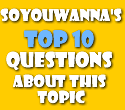Nobody likes to work. But most people prefer working to rummaging through dumpsters for the really fresh waste, so most of us will need a cover letter at some point in our lives. The fact is, you need a cover letter every time you send out a résumé; simply dropping off a résumé with an employer seems impersonal and lazy, and non-government employers avoid employees with those traits.
What is a cover letter? It's a letter (duh) that you send to a potential employer along with your résumé. A cover letter is important because, among other things, (1) it will tell the recipient for whom the résumé is intended, (2) it can elaborate on your knowledge of the company and your desire to work for it, and (3) it allows you to name drop. So if you are on the hunt for a new job, you will need to produce cover letters with brilliance, flair, and speed, and, therefore, you will need to settle in and read this SYW.
1. RESEARCH THE INDUSTRY AND THE EMPLOYER
Each cover letter must be produced for a specific employer. You can recycle some of the text for cover letters within the same industry, but each letter should contain a reference to something about the employer/company and what he/she/it has done. If you're thinking that you don't know anything about a potential employer or what it has done, then bust out the ginseng. You've got some research to do.You should first research your industry and learn:
- important business or technological trends
- significant recent transactions
- hiring trends, popular terms
- phrases and subject matter
This background information about the industry will help you to write all cover letters for jobs in the industry. Then, for each individual employer, you should find out:
- the nature of the company's business
- its major clients or customers
- its history, important recent transactions or developments
- hiring trends and employment needs
Wait a minute -- this research crap sounds like work. It is work, but it will help you get a job. Think: the more you know about an industry and a particular company, the more effective your cover letter will be in communicating that you are a good candidate. People who send in bland, non-specific cover letters communicate (1) that they know little about the industry, and/or (2) that they didn't care enough to research the company they want to work for.
Don't believe us? Read selected excerpts from these two cover letters:
COVER LETTER #1
To whom it may concern:
I have a great interest in your field, and I have been informed that your company is an industry leader. I am thus writing to you to apply for a job.
COVER LETTER #2
Dear Ms. Nice:
After receiving a degree in nuclear waste management and working in a nuclear waste plant for 20 years, I am well aware that your company, the Acme Nuclear Plant, is the most respected in the industry. Your colleague, Mr. Friend, has informed me that Acme is searching for an experienced manager to restructure the Waste division, and I would be grateful for the opportunity to join your team.
OK, these are not stellar letters, but if you were Ms. Nice, which candidate's résumé would you be more likely to read? The second letter (in two sentences) directly addresses a need in the company and a preliminary reason to consider that candidate (with a little namedropping thrown in for good measure).
Now there's just one more little tidbit you DEFINITELY need (which we exemplified above): the name of the person to whom cover letters and résumés should be sent. This last piece of information is very important, and it is usually easy to find. Simply phone the company's main line and ask to speak to someone in personnel, recruiting, or human resources. Whoever picks up the phone in one of those departments should be able to tell you to whom you can send your stuff. If you get an answering machine, call the receptionist again and politely ask if he or she can tell you the name and address of the person who accepts résumés. You probably won't be asked for your name, so don't worry about pestering them or saying the wrong thing. The rest of the information can be discovered through recruiting pamphlets, the career services office at your school (alumni are usually allowed to make use of such resources), the company's website, or newspapers, magazines, or websites that discuss the industry. One last thing: if you know someone who already works at the company and can help you pull strings, send a copy of your résumé and cover letter to that person, and mention their name.


